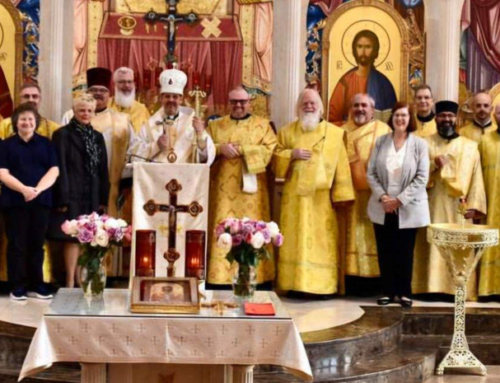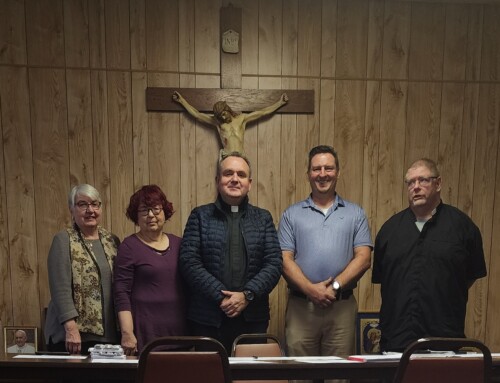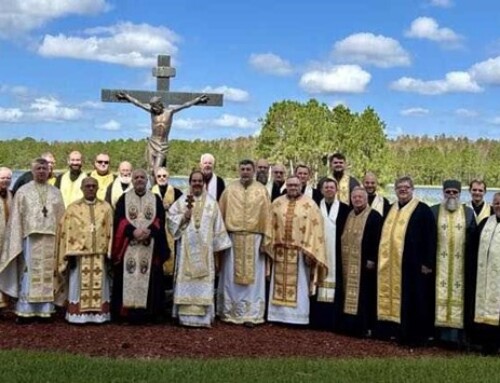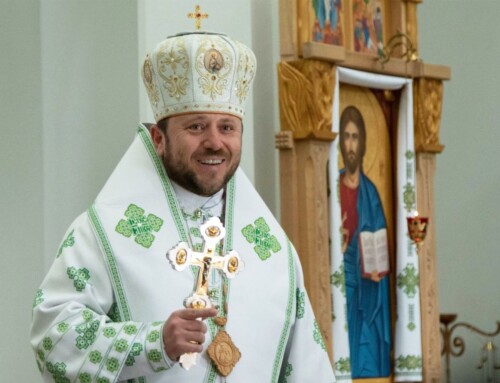Prot. N. 16/516
SERVING ONE’S NEIGHBOUR — DIAKONIA IN THE LIFE OF THE UGCC
Post-synodal Pastoral Letter
Synod of Bishops of the Ukrainian Greek-Catholic Church
To the Clergy, Religious and Laity
As you did it to one of the least of these my brothers, you did it to me (Mt 25:40).
Very Reverend and Reverend Fathers!
Venerable Brothers and Sisters in monastic life!
Dear Brothers and Sisters in Christ!
Having gathers at our Holy Synod in Briukhovychi near Lviv, September 4-11 in the 2016th year of our Lord, we, the bishops of the UGCC, centred our particular attention on a most important aspect of Christian life, that is, on serving one’s neighbour – diakonia – in other words, on the social mission of the Church. This ministry of service flows from our nature as children of God and for every disciple of Christ it finds expression on all levels of Christian life: in personal and family life, in the parish community, in every eparchy, and in the Church as a whole. In the present context of war and forced migration of many of our co-nationals from Crimea and the Donbas, the theme of serving one’s neighbour is especially relevant. Thus, in this post-synodal pastoral letter we would like to share a few thoughts for deeper reflection and indicate several directives for serving one’s neighbour in our Church.
Each and every one of us from our first moment of becoming Christian received a special mandate to serve our neighbour, even if most of us do not remember that moment, because we were infants. In fact, towards the end of the Baptismal Service the priest handed us a lighted candle, saying these words: “Take this lighted candle, and strive throughout your entire lifetime to shine brightly with the light of faith and of good deeds, so that when the Lord will come, you may go forth in radiance to meet Him together with all the Saints, and may enter unhindered into the court of His heavenly glory and reign with Him throughout eternity. Amen.” These “good deeds,” with which we are called to brightly shine, are works of mercy through which we grant our neighbour in need the possibility of experiencing the presence of the merciful God in their lives. Presently, as we conclude the Jubilee Year of Divine Mercy, we have a wonderful opportunity to remind ourselves, that the merciful Lord hurries to help others using our feet, supports the sick and frail with our hands, listens to those who have been wronged with our ears, consoles those who are sad with our mouths, carries the weak with our shoulders, brings others close to Himself with our hearts. In other words, the vocation of every Christian is to be an icon of God’s goodness and love in the world. And the promise given to us in the Mystery of Baptism, to reign with the Lord throughout eternity, presumes that already here on earth we recognize our “royal” responsibility for diakonia.
Already on the pages of the Old Testament we find many words and appeals in which our Creator demands special care for the poor, for those who are deprived of the basic material resources necessary for life, for the foreigner, widows and orphans: “For the Lord your God is God of gods and Lord of lords, the great, the mighty, and the awesome God, who is not partial and takes no bribe. He executes justice for the fatherless and the widow, and loves the sojourner, giving him food and clothing” (Dt 10: 17-18). The Lord gives clear instructions to the Chosen People regarding the treatment of the poor: “For there will never cease to be poor in the land. Therefore I command you, ‘You shall open wide your hand to your brother, to the needy and to the poor, in your land’ “ (Dt 15:11).
The Lord desires that a godly people be sensitive to the needs of their destitute brothers and sisters, and that He be given praise through sacrifice and charity to those in need. In the Book of Tobit, we read: “Give alms from your possessions to all who live uprightly, and do not let your eye begrudge the gift when you make it. Do not turn your face away from any poor man, and the face of God will not be turned away from you” (4: 7-8). In the Book of the Prophet Isaiah works of mercy are already described as a light which illuminates the soul and surroundings of the benefactor: “If you pour yourself out for the hungry and satisfy the desire of the afflicted, then shall your light rise in the darkness and your gloom be as the noonday” (Is 58:10). And in Proverbs we read: “Whoever is generous to the poor lends to the Lord, and he will repay him for his deed” (Prov 19:17).
In the New Testament, a good part of the signs and wonders of our Lord are acts of divine mercy. When the disciples of John the Baptist ask Jesus whether he is the Messiah, the answer they receive is: “Go and tell John what you hear and see: the blind receive their sight and the lame walk, lepers are cleansed and the deaf hear, and the dead are raised up, and the poor have good news preached to them” (Mt 11:4-5). This Christ allows other to recognize who he is through his works, and he calls upon his apostles to do the same: “Truly, truly, I say to you, whoever believes in me will also do the works that I do; and greater works than these will he do, because I am going to the Father” (Jn 14:12).
Therefore, the Lord commands all of us to engage those who need our help: “Give to the one who begs from you, and do not refuse the one who would borrow from you” (Mt 5:42). He indicates to us that every work of mercy done to our neighbour is as if it is done to Him: “Truly, I say to you, as you did it to one of the least of these my brothers, you did it to me” (Mt 25:40). At the same time, he cautions us that in performing works of mercy we not pursue vainglory or honours: “Beware of practicing your righteousness before other people in order to be seen by them, for then you will have no reward from your Father who is in heaven. Thus, when you give to the needy, sound no trumpet before you, as the hypocrites do in the synagogues and in the streets, that they may be praised by others. Truly, I say to you, they have received their reward. But when you give to the needy, do not let your left hand know what your right hand is doing, so that your giving may be in secret. And your Father who sees in secret will reward you” (Mt 6:1-4).
Charity was an integral part of the life of the Church in apostolic times. In the Acts of the Apostles, we read of Tabitha who “was full of good works and acts of charity” (Acts 9:36), and of the centurion, Cornelius, who “gave alms generously to the people, and prayed continually to God” (Acts 10:2). Saint Paul encouraged the Churches in Corinth and Galatia to support their brethren in need: “Now concerning the collection for the saints: as I directed the churches of Galatia, so you also are to do. On the first day of every week, each of you is to put something aside and store it up, as he may prosper, so that there will be no collecting when I come. And when I arrive, I will send those whom you accredit by letter to carry your gift to Jerusalem” (1 Cor 16:1-3). Elsewhere St. Paul wrote: “Whoever sows sparingly will also reap sparingly, and whoever sows bountifully will also reap bountifully. Each one must give as he has decided in his heart, not reluctantly or under compulsion, for God loves a cheerful giver” (2 Cor. 9:6-7).
The New Testament in a special way brings together the two greatest commandments: love of God, and love of neighbour. As St. John the Theologian writes: “If anyone says, ‘I love God,’ and hates his brother, he is a liar; for he who does not love his brother whom he has seen cannot love God whom he has not seen. And this commandment we have from him: whoever loves God must also love his brother” (1 Jn 4:20-21). If we wish to love God, then we must show this love through a proper attitude towards and concern for our neighbour. If in church we learn to love God, listen to His Word, are sanctified through the Holy Mysteries, receive our Lord’s love, then this is so that, in exiting the church, we give back that which we have received: celebrated “the liturgy after the Liturgy” by performing acts of mercy.
We will never be fully Christian if we only receive, take something from God. Our vocation to love is expressed in serving God by ministering to the person in need. Christian life as bearing witness to selfless love and care towards another person must become our daily style of life, and not merely occasional benevolence which doesn’t give rise to authentic responsibility.
The experience and teaching of the Church from her beginnings to our day bear witness to the indispensability and importance of diakonia in the life of disciples of Christ. Thus, in his First Epistle to the Corinthians, Pope St. Clement (+99) teaches about the salvation that is given through faith in Jesus Christ does not absolve one from good works: “What shall we do, then, brethren? Shall we become slothful in well-doing, and cease from the practice of love? God forbid that any such course should be followed by us! But rather let us hasten with all energy and readiness of mind to perform every good work” (33:1).
In a particular way St. John Chrysostom (349-407) called upon wealthy Christians of the capital city of Constantinople to engage in diakonia: “Would you do honour to Christ’s body? Neglect Him not when He is naked; while here (in church) you honour Him with silken garments, do not neglect Him perishing outside of cold and nakedness” (On the Gospel of Matthew, Homily 50:4).
In our times, Roman Pontiffs continuously remind us of the special mission of the Church to serve our neighbour. Especially eloquent is the teaching of the present Bishop of Rome, Pope Francis, who calls upon the Church to go to the outermost fringes of society, in order to carry forth the light of God’s love and God’s mercy wherever people experience suffering, sadness, and misfortune:
How many uncertain and painful situations there are in the world today! How many are the wounds borne by the flesh of those who have no voice because their cry is muffled and drowned out by the indifference of the rich! During this Jubilee, the Church will be called even more to heal these wounds, to assuage them with the oil of consolation, to bind them with mercy and cure them with solidarity and vigilant care. Let us not fall into humiliating indifference or a monotonous routine that prevents us from discovering what is new! Let us ward off destructive cynicism! Let us open our eyes and see the misery of the world, the wounds of our brothers and sisters who are denied their dignity, and let us recognize that we are compelled to heed their cry for help! May we reach out to them and support them so they can feel the warmth of our presence, our friendship, and our fraternity! (The Face of Mercy, Papal Bull of Indiction of the Extraordinary Jubilee Year of Mercy).
The Holy Father, Pope Francis, as an authentic teacher of faith, not only calls to sensitivity in regards to the poor. He is the first to provide an example of sacrificial service to the poor and destitute, especially in the way he treats the Ukrainian people. This is borne witness by donations which were collected throughout all the parishes of Europe, which together with the personal gift of the Holy Father constitute the core of the humanitarian action, “the Pope for Ukraine.” This unprecedented gesture of mercy and compassion, shown us by Pope Francis, compels us to deep gratitude, and at the same time to generosity and sacrifice in regards to those who are subjected to injustice and hurt.
The Ukrainian Greek-Catholic Church throughout her thousand-year history has constantly provided an example of sacrificial service to her own people, especially in dark times of repression, statelessness, and enslavement by different adverse powers, as well as in periods of internal political and social crisis.
We do well to remember the social ministry of the Metropolitans of Halych, in particular, Josyf Sembratobych (1821-1900), who through his action essentially eradicated the illness of alcoholism among the people of Halychyna. Noteworthy is the fact that his Pastoral Letter, dedicated to confront drunkenness and alcoholism, the Metropolitan titled “On the Dignity of Man,” emphasized that any disordered passion or dependency destroys human dignity and self-respect, and that the renewal of physical and moral health restores a person’s original dignity and beauty.
The social ministry of the Church was particularly developed under Metropolitan Andrey Sheptytsky. The clergy played leadership roles in the cooperative movement in villages and towns, sisters-nuns established education and care centres for children. The Metropolitan himself made great efforts in the renewal of Ukrainian culture and art, and with his prophetic word he instilled among the faithful and healthy way of life, defended the institution of the family, fostered the education of youth in the spirit of evangelical patriotism and love for neighbour.
Throughout the many years of his episcopal ministry the Venerable Andrey Sheptytsky often directed his attention towards the indispensability of acts of mercy as an expression of living faith and love: “One must demonstrate Christian love through works! All talk is empty, if it is not followed be deeds!” (Pastoral Letter “The Greatest Commandment,” 1901). In his words, “there is no surer way to earn divine mercy than by mercy towards one’s neighbour” (Pastoral Letter for Great Lent, 1929). Metropolitan Andrey understood that through works of mercy the Gospel becomes visible, and our faith acquires a salvific specificity.
In the times of the communist regime, when on its homeland our Church was persecuted, we felt the great solidarity and generous support of our faithful abroad. There Ukrainians, gathered around their pastors under the leadership of Confessor of Faith, Patriarch Josyf, established not only ecclesial life, but also social service: primary and secondary schools, centres of higher learning, female and youth organizations, senior centres, etc. Our parishes became places of very active community life fostering in the hearts of the faithful a love of God and of their suffering people.
Having emerged from the underground, our Church in Ukraine began rebuilding her structures—parishes, monasteries, educational centres—and immediately took on an active role in community building by which she gained moral authority not only among her own faithful, but among all people of good will in Ukraine. Protection of the unborn, the sobriety movement, pastoral programs to eradicate the sickness of corruption, support of family values, constant appeals for honesty and accountability in the political process, chaplaincy ministries for the military, in prisons, in hospitals, pastoral guidance in peaceful efforts of the people for their rights and freedoms—this is a far from a complete listing of areas where the Church raised her voice in defence of human dignity and the harmonious development of broader society on the foundation of divine law.
Special note must be made of the current sufferings that have been caused by the war in Ukraine. Difficult challenges which have befallen us have also revealed the incredible generosity and selflessness of our people in Ukraine and abroad. We thank God for these noble expressions of the Ukrainian spirit that we are witnessing over the past three years of struggle for a better future for our people. Yet thousands of those killed, tens of thousands of the gravely wounded, millions of exiles and refugees will continue to appeal for mercy, solidarity, and love in action for a long time. We do not have a right to grow accustomed to their sufferings, to become deaf to their cries, to ignore their misfortune. On the contrary, let our living faith find expression in an even greater solidarity with the victims of war, and may this solidarity take on a practical aspect, in response to the needs of concrete families or individuals, and according to the capabilities of the parish community.
The Ukrainian Greek-Catholic Church is called to engage in diakonia both at the level of her individual members, as well as at the level of those communities to which we belong: Christian families, fraternities, sisterhoods, parishes, monasteries and religious congregations, eparchies, metropolias, and our Church as a whole. The important thing is that each one of us recognize a personal vocation to service his or her neighbour and thus allow them to experience the love of God in their own life. The Holy Spirit speaks to us in many different ways: He may call some to help those in need who live close by, while others he invites to joint action in order to help brothers and sister who live far away.
Frequently the prerequisite for coordinated service is found in the existence of established organizations. In Ukraine, we have successfully established “Caritas” centres, at national and eparchial levels, an organization that works under the patronage of the Church hierarchy and with its support, and which, by systematically witnessing the faith and addressing the real needs of the suffering, has earned the respect and trust not only of the Church faithful, but also of many in the broader society.
However, we do not have a right to pass on this responsibility to serve solely to particular structures: the state, social services, or even the afore-mentioned church organization. All members of the Church without exception are called to do works of mercy: bishop, priest, layperson, man and woman, the elderly, and the young. Service to our neighbour is not the privilege of the wealthier among us, but a task given to each one of us as we can always find someone who is in a situation that is worse than ours.
At the same time, it is important to sacrifice with a proper spirit, that is, with a sense of love for each human being, created in the image and likeness of God. In performing charitable activity, ecclesial charitable organizations and groups should not limit themselves to collecting and distributing funds and materials or goods, but they should always pay particular attention to the person who has found themselves in need, and fulfil in the Christian community a particularly valuable formational function, fostering the growth of a sense of social responsibility, a readiness to share, respect, love, and mercy in the spirit of Christ’s Gospel. The benevolence of the Church, on whatever level it may find expression, cannot simply become another form of organized social assistance. Works of mercy are a gesture of love and sincere attention directed towards those who need our help. It is an opportunity to grant others the possibility of encountering the living Christ.
As part of the “Vibrant Parish” program we call upon every parish community this year to direct particular attention to diakonia as “an encounter with the living Christ.” In parishes there are many concrete ways to engage in this ministry: visiting the sick, assisting to the poor, feeding the hungry, protecting orphans, supporting victims of injustice, working for peace, comforting the sorrowful, defending the unborn, etc. We should remember that, firstly, we are responsible for those in need who live in our midst. And then, as much as possible, the parish should support the charitable activity of the Church on a regional, national, and international level.
If this has not been done already, every parish should create a charitable group or parish “Caritas” centre, which would have as its goal the involvement of the faithful in witnessing to God’s merciful love, be it towards members of the parish community, be it “in the world.” With the support of eparchial “Caritas” organizations, such a parish centre would be responsible for preparing the entire parish community to fulfil its responsibility of translating its faith into concrete works of mercy. It should also train persons and groups which can work in the Church in charitable activity.
In this, we need not go far to show mercy and love to our neighbour. Frequently those who thirst for our attention, kindness, support, understanding, and love are next to us: in a neighbouring building, in the same apartment complex, under one roof. First of all, we should look upon the members of our own family with eyes of mercy.
The family is a place of growth in faith, a school of service and love. It is not a coincidence that St. Paul connects the state of one’s faith with the state of mutual support and concern for one another in the family: “But if anyone does not provide for his relatives, and especially for members of his household, he has denied the faith and is worse than an unbeliever” (1 Tim 5:8). On the other hand, a family where there is a spirit of mutual love and support becomes a source of mercy that nourishes by its streams of love many people, near and far. Indeed, it is towards this that the grace given to a couple in marriage on its day of crowning is directed, having established a Christian family as a domestic Church—a community of divine love and mutual service. This ministry of service, which begins in the family, extends far beyond its boundaries. This is wonderfully expressed in prayer at the Order of Crowning: “And grant them of the dew of heavens above and of the abundance of the earth, fill their homes with wheat, wine and oil, and with all good things, so that they may give to the needy.”
The faithful of the UGCC are also called to participate in various benevolent and volunteer initiatives of which many have emerged in the this time of military strife. Any good initiative can become a concrete response to the cry of a brother or sister suffering misfortune. The Church support every free expression of concern by the baptised regarding individuals and entire groups who are in need. Therefore, as Pastors of the Church, we always welcome these initiatives as one of the forms of participation of all the faithful in the charitable mission of the Church.
Dear brothers and sisters, let us remember that poor Lazarus always sits at the gate of our home as in the Gospel parable. Let us, therefore, open our hearts to him and show him God’s love and mercy, if not by the joint action of the Church, then secretly and unnoticed by others, so that the words of our Lord might apply to us: “Come, you who are blessed by my Father, inherit the kingdom prepared for you from the foundation of the world. For I was hungry and you gave me food, I was thirsty and you gave me drink, I was a stranger and you welcomed me, I was naked and you clothed me, I was sick and you visited me, I was in prison and you came to me… Truly, I say to you, as you did it to one of the least of these my brothers, you did it to me” (Mt 25:34–36,40).
The blessing of our Lord Jesus Christ, the love of God the Father, and the communion of the Holy Spirit be with all of you!
On behalf of the Synod of Bishops
of the Ukrainian Greek-Catholic Church
+ SVIATOSLAV
Given in Kyiv
at the Patriarchal Cathedral of the Resurrection of Christ
on the day of our Venerable Parasceva of Ternovo
October 27, 2016 A.D.





